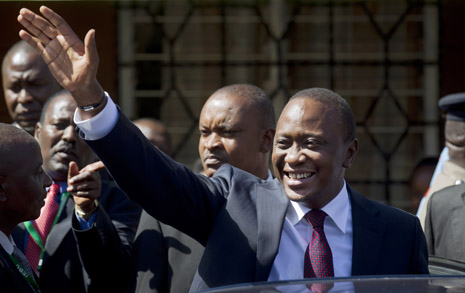As a Kenyan it is taboo to comment on the issue of the President and his deputy’s trial at the International Criminal Court at The Hague. In Kenya as is always the case, there is an ethnic prism through which most, social, political and economic issues and opinions are examined. Every opinion is pried open and too much read into it. The trial of the President Uhuru Kenyatta and his Deputy, William Ruto at The Hague requires an intricate balancing act. A balancing act that requires balancing opinion and reason between the insatiable quest for justice for the victims of the post 2007 general elections violence with the question of the sovereignty of the people and the state of Kenya.
Kenyan politics is fluid, friends become foe, and foes become friends faster than the blink of an eye. As a consequence affiliations change and certainly do opinions. Thus at the moment getting a rational opinion from many a Kenyans is a difficult task, as many an opinion are heavily intoned with political sympathy or apathy for President Kenyatta and his deputy Ruto.
During the elections of 2007, Mr Ruto and Mr Kenyatta were in two different camps. Mr Ruto was a kingpin of the Orange Democratic Movement (ODM), which fielded Raila Odinga as its presidential flag bearer for the general election that year. Mr Ruto is an influential man in Kenya he controls a swathe of votes from the vote rich Kalenjin community from what was then referred to as the Rift Valley province.
Mr. Kenyatta on his part was in the Party of National Unity, a political order which fielded the then incumbent Mwai Kibaki as its presidential flag-bearer. Though at the onset it seemed as if the post-election Violence were spurred on by what was seen as the most bungled election in Kenya’s history; deep seated resentment and hatred among tribes over other issues other than the election started finding expression in the violence. Flare-ups around the issue of land became a big issue, especially being that it is that the Kalenjin (Mr. Ruto’s community) and the Kikuyu’s (Mr. Uhuru’s community) share a common boarder. The Kikuyu and the Kalenjin share, markets, land resources and family times. However the politics of the year 2007 strained this to the lowest ebb. In the post-election violence of the year 2007-2008 the major acts of violence were between these two communities although there was violence amongst other communities especially in the urban slums. It is Mr. Ruto’s Community and Mr. Kenyatta’s communities that were at the thick and thin of things during the post elections violence of 2007.
Mr. Kenyatta and Mr. Ruto and their communities are inextricably linked by conflict, politics, economics, trade and other shared interests. Certainly it is the giant that is International Criminal Court that brought Mr. Kenyatta and Mr. Ruto who had been hitherto been in different political camps together. Their political collaboration has brought an uneasy peace between the two communities together.
The trial of Mr. Uhuru and Mr. Ruto at The Hague is threatening to bust Kenya at its seams. We have so many questions, should we forget and wish away what happened in the year 2007 for the peace we enjoy now? Is that peace long lasting? What happens to the victims of the 2007 post-election violence? What happens to Kenya’s sovereignty, should the head of state stand trial in a foreign court?
Balancing issues of justice with Kenya’s sovereignty is arduous a task in itself. There are those within the Kenyatta and Ruto stables who have a feeling that the whole quest for justice by the International Criminal Court was politicized from the very onset.
The victims of the 2007 post election violence need justice. In my opinion the prosecution of President Uhuru and his deputy is good for Africa but bad for Kenya. It is good that despots and tyrants around Africa have a hanging cloud of international prosecution over them each day. It is important that African rulers remember that the International Community will not tolerate impunity and wanton loss of life and property. It is good and important that African leaders have a constant reminder that a la Rwanda 1994, violence and crimes against humanity will and shall not be tolerated by the international community.
As for Uhuru since he ascended into office earlier this year he has been trotting all over the African continent, whispering into the ears of African leaders. He has been urging them to stand with him, alluding to the fact that what is happening to him might happen to them that was why the African Union earlier this week issued a resolution that; ‘No African Head of State Shall Stand Trial in an International Court.’ They further petitioned the International Criminal Court to defer the trial of Mr. Kenyatta and Mr. Ruto, until the two leave office. The African Union is about self-preservation, not the preservation of the African people but the preservation of the banal desires of African heads of states to hold on to power till the end of time.
[Photo: WEF]

